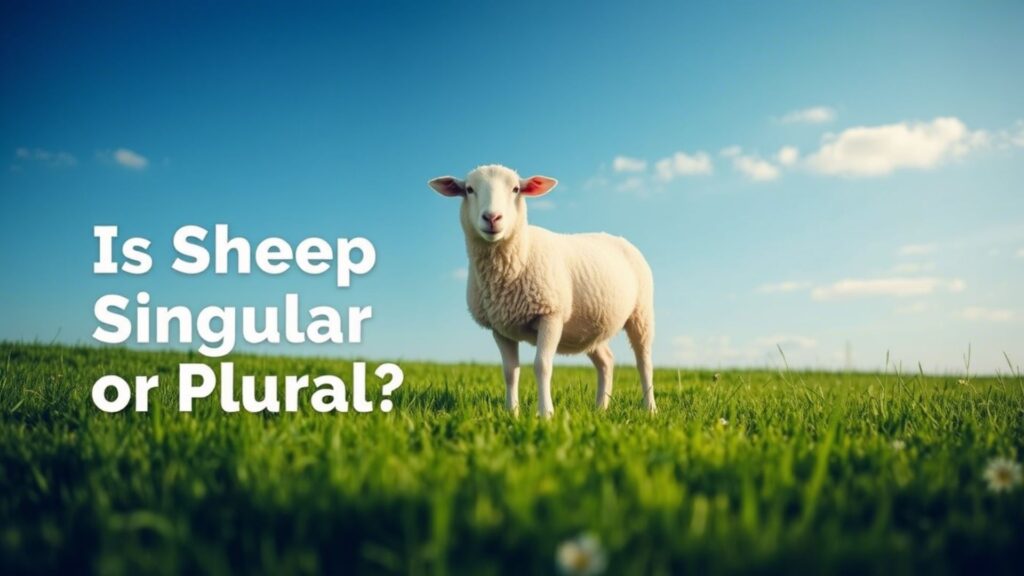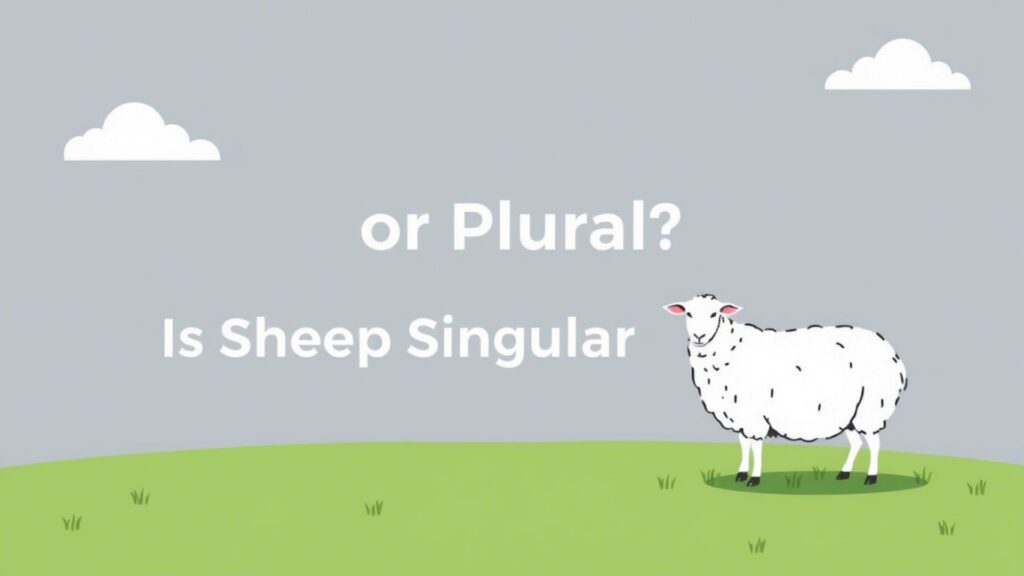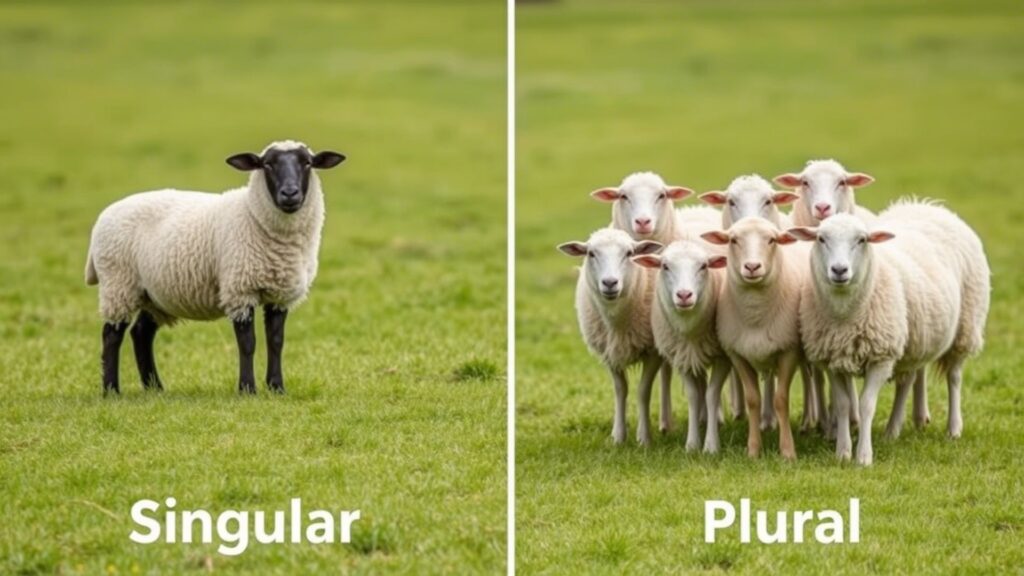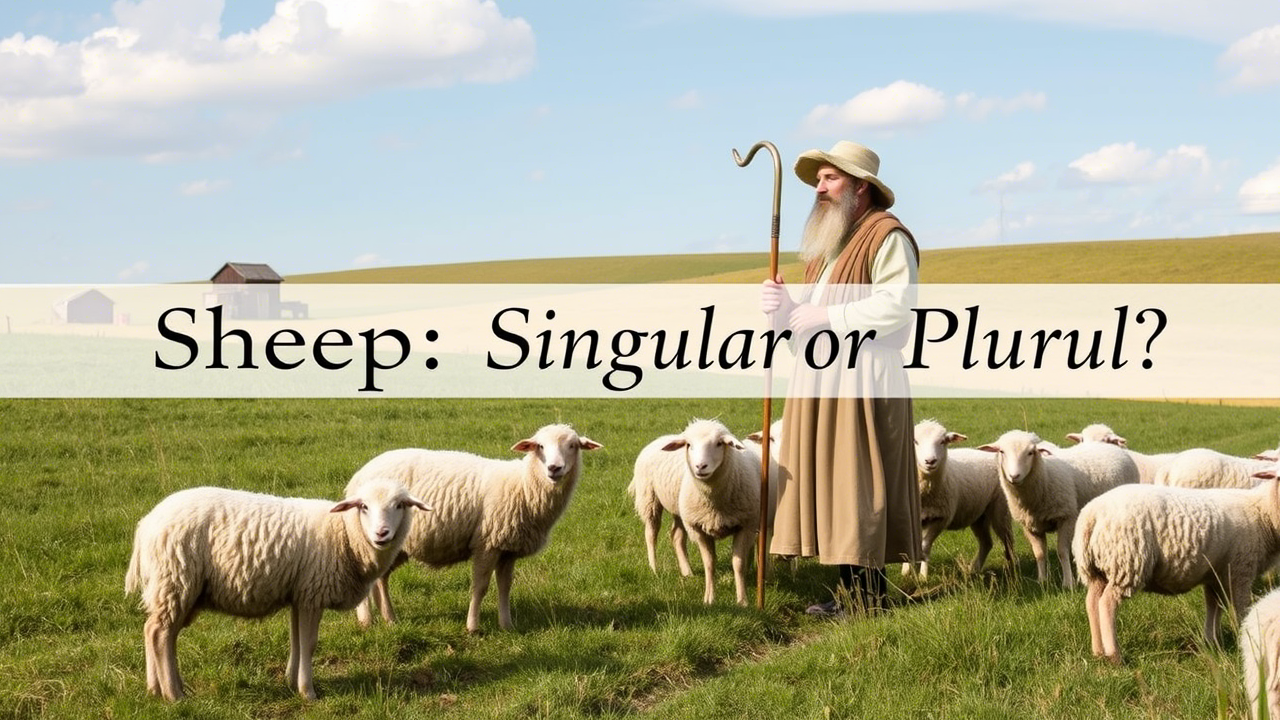The English language loves to break its own rules. You memorize a pattern, only to be thrown off by an exception the very next day. One of the most common grammar curveballs? The word “sheep.” You’ve probably paused at some point and asked yourself: Is “sheep” singular or plural?
Let’s dig into the quirks of this woolly word and uncover how it behaves in both singular and plural contexts. We’ll explore common mistakes, idiomatic usage, and real-life grammar scenarios to make this concept crystal clear.
The Short Answer: One Word, Two Jobs

“Sheep” is both singular and plural.
That’s right. It follows the same pattern as words like deer, moose, elk, and bison all examples of irregular plural nouns that stay the same whether you’re talking about one or many.
- ✅ Correct: “That sheep is grazing alone.” (singular)
- ✅ Correct: “The sheep are scattered across the field.” (plural)
- ❌ Incorrect: “Those sheeps look fluffy.” (never use “sheeps”)
Why Not “Sheeps”? Understanding Irregular Plural Nouns
Most English nouns follow this basic rule:
Add -s or -es to make them plural.
For example: cat → cats, bus → buses
But some words especially those borrowed from Old English or with Germanic roots don’t follow that rule. “Sheep” is one of them. These belong to a category known as irregular plural nouns, where the plural form is identical to the singular.
Other examples include:
| Singular | Plural |
|---|---|
| deer | deer |
| moose | moose |
| fish | fish/fishes (contextual) |
| bison | bison |
These forms are often tied to animal classification and behavior, especially animals traditionally herded, hunted, or domesticated.
Scenario Example: An ESL Student’s Email
Let’s put this into a real-world context:
Subject: Grammar Check – Plural of Sheep
Hi Ms. Harper,
I wrote this sentence: “The shepherd moved the sheeps to a new field.” But now I’m confused. Is “sheeps” correct? Should it be “sheep”?
Thank you!
Best,
Akira
Reply:
Hi Akira,
Great question! The correct sentence is: “The shepherd moved the sheep to a new field.”
“Sheep” stays the same whether you’re talking about one or many. “Sheeps” is not a word in standard English grammar.
Keep up the great work!
Warmly,
Ms. Harper
How Can You Tell If “Sheep” Is Singular or Plural in a Sentence?
Since the word doesn’t change, context clues become your best friend. Look at:
- Verb agreement:
- The sheep is → singular
- The sheep are → plural
- Modifiers and determiners:
- One sheep
- Several sheep
- A flock of sheep
- That sheep / Those sheep
This leads us into another helpful area: collective nouns.
Herd or Flock? Using Collective Nouns with “Sheep”

If you’ve ever heard someone say “a flock of sheep”, you’ve already encountered a collective noun a word that refers to a group acting as one.
Some collective nouns commonly used with animals include:
| Animal | Collective Noun |
|---|---|
| sheep | flock |
| cattle | herd |
| goats | tribe / herd |
| pigs | sounder / drove |
| birds | flock / flight |
So you can say:
- “The flock of sheep was startled by the wolf.”
- “Our herd of sheep grazes near Acacia trees in Bukhara.”
Types of Sheep: More Than Just Woolly Animals
In grammar discussions, we often use the word “sheep” generically. But in reality, the terminology gets more specific:
- Ram – adult male sheep
- Ewe – adult female sheep
- Lamb – a young sheep
- Tup – breeding male (UK)
- Wether – castrated male sheep
- Shepherd – person who herds sheep
These words help refine sentence structure in descriptions, especially in contexts like farming, animal science, or storytelling.
Fun Idioms That Use the Word “Sheep”
English is full of idioms that keep this curious noun in daily use. Some of these idiomatic expressions are colorful, some are cautionary, and some are just plain amusing.
- “A wolf in sheep’s clothing” – someone pretending to be harmless
- “The black sheep of the family” – a person who stands out in a negative way
- “To make sheep’s eyes at someone” – to look at someone with affection or longing
- “If one sheep leaps over the ditch, all the rest will follow” – people tend to follow the crowd
For example:
“Don’t be the black sheep in this team, Ryan. We all submitted the report on time.”
Idioms like these often confuse language learners, because the word “sheep” is used figuratively not literally. But they’re great for boosting vocabulary and cultural fluency.
Why “Counting Sheep” Isn’t About Grammar
You’ve probably heard the phrase “counting sheep to fall asleep.” This classic sleep-related idiom doesn’t reflect grammar confusion it’s just an old visualization technique to help with insomnia.
But even here, grammar shows up:
“He counted sheep, but sleep never came.”
Again, we don’t say “he counted sheeps.”
Language Learning Tips: Avoiding Common Mistakes

Whether you’re a native speaker brushing up or an ESL learner navigating tricky rules, here are a few pointers to remember:
✅ Always write “sheep,” never “sheeps.”
✅ Use verb agreement and contextual number to clarify meaning.
✅ Remember: “Sheep” can refer to one or many.
✅ Learn idioms and collective nouns for richness and clarity.
✅ Practice using “sheep” in various sentence structures.
Grammar Usage Note: Plural Exceptions Matter
“Fish” and “sheep” often get lumped together in grammar lessons. Here’s a quick chart to compare animal nouns pluralization:
| Word | Singular | Plural | Notes |
|---|---|---|---|
| sheep | sheep | sheep | Irregular plural |
| fish | fish | fish/fishes | “Fishes” is used in scientific texts |
| goat | goat | goats | Regular plural |
| deer | deer | deer | Irregular plural |
| cow | cow | cows | Regular plural |
Conclusion
So, is “sheep” singular or plural?
It’s both. The trick lies in your sentence structure, verb choice, and modifiers. Once you’ve got that down, you’ll never fall into the “sheeps” trap again.
Whether you’re writing an email, creating an ESL grammar lesson, or explaining why a flock of sheep blocked your car on a mountain road, this word will come in handy.
And next time someone asks you this question, you can confidently respond without hesitation or a second guess.

